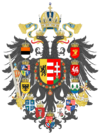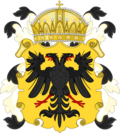Empire of Karnia
Kaisertum Karniareich (de) | ||||
| ||||
| ||||
| Motto Fiat iustitia, et pereat mundus Let justice be done, though the world perish.(Latin) | ||||
| Anthem Ária Paulistana | ||||
 Imperial territory. Click to expand. | ||||
| Capital city | Vídeň | |||
|---|---|---|---|---|
| Largest city | Vídeň | |||
| Official language(s) | Czech, German (de jure) English (de facto) | |||
| Official religion(s) | Roman Catholicism | |||
| Demonym | Karnian | |||
| Government | Constitutional monarchy | |||
| - Emperor | Emperor Oscar | |||
| - Minister-President | TBD | |||
| Legislature | Reichsratt Herrenhaus (upper house) Abgeordnetenhaus (lower house) | |||
| Estabilished | 02 February 2016 (Proclamation) | |||
| Compromise of 2016 | 10 March 2016 | |||
| Population | 09 (2016 estimate) | |||
| Currency | Czech koruna (Kč) (de facto), Karnian Papiermark, Ruthenian Mark (RM) (RMK) (de jure) | |||
| Date format | dd-mm-yyyy | |||
| Official website | ||||
Karnia, officially the Empire of Karnia (German: Kaisertum Karniareich), is an autonomous territorial entity which claims to be a sovereign state but is more commonly referred to as a micronation by external observers. Founded on the Czech Republic, Karnia declared independence in 2 February 2016. It is governed as an absolute monarchy. The Empire of Karnia is a social project based on the history of the Habsburg Monarchy (1526–1804) operating as a nation state, or using the most well known expression, a micronation.
History
Karnia was founded on 2 February 2016 at Prague, through a political act signed by Anton I Wenzel of Karnia, who was elected as the first Kaiser; Calvin Gustav, the first and acting Minister-President and Louis Taünn, the President of the Reichsrat, the Imperial Council. Karina was founded to preserve and celebrate the tradition of the Czech monarchy under the Habsburgs. After some weeks, the project didn't achieved the expectd result. Without a Constitution or a well estabilished system of government, the Karnian government understood they need help to estabilish themselves. Then, Kaiser Anton and the President of the Reichsratt, Louis Taünn found their help in the Ruthenian Government.
Karno-Ruthenian Compromise of 2016
With many problems to establish a functioning government, a constitution, and especially in achieving recognition of other micronations, they realized a micronational project was much more difficult to drive than they would have imagined. When the Kingdom of Ruthenia offered the necessary help, they accepted enthusiastically. For weeks, while governments and their sovereign approached, the Ruthenian government provided help, teaching from the writing of decrees to the making of national symbols. They guided the creation of a page on Facebook and Twitter, as well as the material to be presented, but nothing was successful.
With the break between the Kaiser and the Minister-President caused precisely by disagreements about the conduct of government, the government of Karnia requested Ruthenian intervention. The cost of this intervention to save the newly created project was to deliver the Imperial Crown to the King of the Ruthenians. In return, the project would be expanded and be at par with the Kingdom of Ruthenia. The result of this negotiation was the Karno-Ruthenian Compromise of 2016.
Under the terms of the Compromise, Karnia and Ruthenia would maintain separate parliaments each with its own prime minister under a single monarch. In the Ruthenian half, the King-appointed Government would be responsible only to the Parliament instead of the King, which gave Ruthenian a great amount of autonomy, especially in internal matters. In the Karnian half, however, the Emperor would have the power to both appoint and dismiss its Prime Minister and cabinet members. The monarch's common government, in which its ministers were appointed by the Monarch and responsible to him, had the responsibility for the armed forces, foreign policy and for the customs union.
Foreign relations
The Empire of Karnia established and maintained diplomatic relations with other nations through the Kaiser with approval of the Minister-President and the President of the Imperial Council until the signature of the Karno-Ruthenian Compromise of 2016. After that, the Ministry of Foreign Affairs of Ruthenia assumed the responsability for the foreign affairs of Karnia.
 Kingdom of Coria
Kingdom of Coria Kingdom of Trentonia
Kingdom of Trentonia Consulat of Surland
Consulat of Surland
Government
Kaiser
The Emperor of Karnia (German: Kaiser von Karniareich) is an elective imperial title and position proclaimed in 2016 by Emperor Anton I, a member of the House of Wenzel, the imperial family of Karnia. The Emperor retain the title of Archduke of Karnia. The wife of the Emperor bore the title of Empress, while other members of the family use in his own right the title Archduke or Archduchess. The eldest son of the monarch bore the title of Crown Prince (German: Kronprinz); other designated successors were called Thronfolger (in addition to their title of Archduke). The first Kaiser was Anton I, the Founder, succeeded by Oscar I following the Karno-Ruthenian Compromise of 2016.
List of monarchs
| No. | Name | Portrait | Arms | Reign | Era Reign duration |
House | Title | |
|---|---|---|---|---|---|---|---|---|
| I | Anton I |  |
 |
02 February 2016 |
10 March 2016 |
Karnian era 1 month, 8 days |
Wenzel | Kaiser of Karnia |
| First Emperor of Karnia and founder of the Empire. He laid the foundations of the Austro-Hungarian culture in Karnia-Ruthenia and became the second president of the Imperial Council of Karnia. He was also the Karnian signatory of the Karno-Ruthenian Compromise of 2016. For his short reign, he is called "the Brief", though he was sometimes referred to as "the Founder". | ||||||||
| II | Oscar I |  |
 |
10 March 2016 |
present | Ruthenian era 8 years, 1 month, 17 days |
Goëtzën-Thomaz-Rocha | Emperor of Karnia and King of Ruthenia |
| First Emperor-King of Karnia-Ruthenia. Second Emperor of Karnia and second King of Ruthenia. Called "the Constitutional", he was the main author the two constitutions, as well as the civil and penal code of the Kingdom of Ruthenia. He was also the responsible and author of Karno-Ruthenian Compromise of 2016 that founded the Empire of Karnia-Ruthenia. | ||||||||
Reichsrat
The Imperial Council (German: Reichsratt) is the legislature of the Karnian Empire since its foundation. It is a bicameral body: the upper house is the House of Lords (German: Herrenhaus), and the lower house was the House of Deputies (German: Abgeordnetenhaus). To become law, bills had to be passed by both houses, signed by the government minister responsible, and then granted royal assent by the Emperor. After having been passed, laws were published in the Reichsgesetzblatt (lit. Reich Law Gazette), in the same way that used to happen in the Imperial Council of Austria from 1861 to 1918. The current President of the Reichsratt is Louis Taünn.
Minister-President
The Minister-President of Karnia is the head of government of Karnia. In his capacity as chairman of the Government, the Minister-President represents the federal authority of the executive branch. Though formally an equal member of the cabinet, the Minister-President is considered to be the most powerful position in Karnian politics after the Emperor, and as such is the nation's de facto chief executive. The current Minister-President of Karnia is Calvin Gustav.

